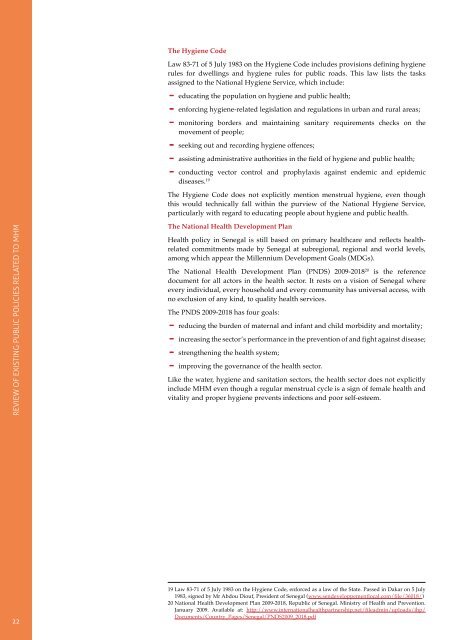1wE4FuZ
1wE4FuZ
1wE4FuZ
Create successful ePaper yourself
Turn your PDF publications into a flip-book with our unique Google optimized e-Paper software.
The Hygiene CodeLaw 83-71 of 5 July 1983 on the Hygiene Code includes provisions defining hygienerules for dwellings and hygiene rules for public roads. This law lists the tasksassigned to the National Hygiene Service, which include:––educating the population on hygiene and public health;––enforcing hygiene-related legislation and regulations in urban and rural areas;––monitoring borders and maintaining sanitary requirements checks on themovement of people;––seeking out and recording hygiene offences;––assisting administrative authorities in the field of hygiene and public health;––conducting vector control and prophylaxis against endemic and epidemicdiseases. 19The Hygiene Code does not explicitly mention menstrual hygiene, even thoughthis would technically fall within the purview of the National Hygiene Service,particularly with regard to educating people about hygiene and public health.Review of existing public policies related to MHMThe National Health Development PlanHealth policy in Senegal is still based on primary healthcare and reflects healthrelatedcommitments made by Senegal at subregional, regional and world levels,among which appear the Millennium Development Goals (MDGs).The National Health Development Plan (PNDS) 2009-2018 20 is the referencedocument for all actors in the health sector. It rests on a vision of Senegal whereevery individual, every household and every community has universal access, withno exclusion of any kind, to quality health services.The PNDS 2009-2018 has four goals:––reducing the burden of maternal and infant and child morbidity and mortality;––increasing the sector’s performance in the prevention of and fight against disease;––strengthening the health system;––improving the governance of the health sector.Like the water, hygiene and sanitation sectors, the health sector does not explicitlyinclude MHM even though a regular menstrual cycle is a sign of female health andvitality and proper hygiene prevents infections and poor self-esteem.2219 Law 83-71 of 5 July 1983 on the Hygiene Code, enforced as a law of the State. Passed in Dakar on 5 July1983, signed by Mr Abdou Diouf, President of Senegal (www.sendeveloppementlocal.com/file/36018/)20 National Health Development Plan 2009-2018, Republic of Senegal. Ministry of Health and Prevention.January 2009. Available at: http://www.internationalhealthpartnership.net/fileadmin/uploads/ihp/Documents/Country_Pages/Senegal/PNDS2009_2018.pdf



